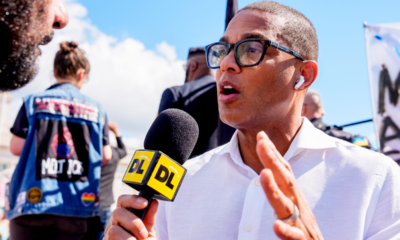Education
Minnesota Student Detained by ICE Was Not an Activist, Lawsuit Says

The University of Minnesota graduate student who was detained by immigration agents last week had not participated in campus activism or been outspoken about political issues, according to a lawsuit he filed on Sunday in federal court challenging the legality of his arrest.
Instead, the issue that appears to have put the student, Dogukan Gunaydin, on the radar of Immigration and Customs Enforcement is more mundane: a 2023 drunken-driving case in which he pleaded guilty.
After the university disclosed in a statement Friday night that a student had been taken into immigration custody, there was rampant speculation that the incident was related to pro-Palestinian activism, as has been the case at several other universities. Top elected officials, including Gov. Tim Walz of Minnesota and members of Congress, issued statements expressing concern, and students held protests on campus.
But no evidence of activism emerged in the case of Mr. Gunaydin, 28, a Turkish citizen who was pursuing a master’s degree in business administration. In an emailed statement, the Homeland Security Department said that Mr. Gunaydin had been arrested after the State Department revoked his visa over the D.U.I. case. “This is not related to student protests,” the statement said.
Immigration lawyers and other experts say they worry that the detention may signal a new front in the Trump administration’s approach to immigration enforcement.
The government routinely revokes student visas over criminal cases, but typically the holder has the opportunity to challenge the revocation with the help of a lawyer, or is allowed to leave the country voluntarily.
Mr. Gunaydin’s case was different. Another puzzling fact, according to the lawsuit, was that a computer system did not show his visa as revoked until several hours after he was taken into custody Thursday morning.
Starting in 2015, the State Department issued guidance making clear that a drunken-driving arrest could be grounds to revoke a visa. Since then, according to Debra Schneider, an immigration lawyer in Minneapolis, many foreigners working or studying in the United States have received letters notifying them about the revocation of a visa after a run-in with the law.
Yet, Ms. Schneider said, people on temporary work and student visas often manage to get visas reinstated, particularly if the circumstances of their cases are not egregious.
“I have never had someone put in custody by ICE over a D.U.I.,” she said.
In an emailed statement, the State Department said it would not discuss Mr. Gunaydin’s case, citing privacy considerations. But the department said: “The United States has zero tolerance for noncitizens who violate U.S. laws. Those who break the law, including students, may face visa refusal, visa revocation and/or deportation.”
Hannah Brown, Mr. Gunaydin’s lawyer, did not respond to requests for comment on Monday.
Mr. Gunaydin was taken into custody at approximately 9:30 a.m. Thursday after he stepped out of his St. Paul, Minn., residence to head to class, according to the lawsuit. The immigration agents drove him to the ICE office in St. Paul, where officials told the student that his visa had been “retroactively revoked,” according to the lawsuit.
“Mr. Gunaydin feared he was being kidnapped,” the lawsuit said, adding that officials provided no information on why the visa had been revoked.
That afternoon, roughly seven hours after Mr. Gunaydin was taken into custody, the online government registry of international student visa information showed that his visa had been revoked, according to the lawsuit. The system did not provide a clear explanation for the revocation but listed him as having failed to maintain legal status.
That evening, Mr. Gunaydin was told that he would be seeing an immigration judge on April 8, and he was later booked into the Sherburne County jail, which is roughly 35 miles northwest of downtown Minneapolis.
It was not clear on Monday whether Mr. Gunaydin had been formally placed in deportation proceedings.
His lawsuit lists President Trump, Secretary of State Marco Rubio and several senior officials at Homeland Security as defendants. The suit also seeks Mr. Gunaydin’s release from custody, arguing that his arrest violated his constitutional right to due process, as well as administrative law, because his visa was still valid when immigration agents took him into custody.
Carl C. Risch, who oversaw visa matters for most of Mr. Trump’s first term as an assistant secretary of state, said officials revoked visas as a result of arrests with “great frequency” over the years. But he suggested that it was unusual for agents to detain an international student over an old D.U.I. case without warning.
Mr. Risch, who is now in private practice at Kurzban Kurzban Tetzeli & Pratt, said federal authorities would historically have sought to detain “someone who was considered to be a danger to the community, perhaps somebody with a very serious or concerning criminal background, ties to terrorist organizations.”
If the government starts regularly detaining and deporting visa holders over misdemeanors like drunken-driving, Mr. Risch said, that would constitute a “change in policy, an escalation.”
On Monday, the president of another Minnesota school — Minnesota State University, Mankato — revealed that a student there was also taken into ICE custody last week.
The president, Edward S. Inch, said that no reason was given for the arrest on Friday. He said in a statement that he had reached out to state and federal officials “to share my concern and ask for their help in curbing this activity within our campus community of learners.”
The statement neither identified the student nor provided details of the events leading up to the arrest.
Mr. Gunaydin was arrested on June 24, 2023, after a Minneapolis police officer described seeing a car maneuver erratically around 1:50 a.m., according to a charging document. Mr. Gunaydin told the officer that he had drunk vodka earlier that evening, according to the document. A breathalyzer test showed that he had an alcohol blood level of 0.17 percent — well over the 0.08 percent legal limit to drive.
In March of last year, Mr. Gunaydin pleaded guilty to driving while impaired, a misdemeanor, according to court records. A judge ordered him to perform community service, attend a D.U.I. clinic and refrain from future traffic violations.
After the conviction, the lawsuit said, Mr. Gunaydin was admitted into business school and awarded a scholarship.
“He has maintained a full course load with a high G.P.A. and served in the M.B.A. Student Association,” according to the lawsuit.
Ana Ley and Stephanie Saul contributed reporting.

Education
After F.B.I. Raid, Los Angeles School Board Discusses Superintendent
Board members are having an emergency meeting a day after agents raided the home and office of Alberto Carvalho, the Los Angeles Unified School District superintendent. The F.B.I. also searched the Florida home of a consultant with ties to the schools chief.
Education
How A.I.-Generated Videos Are Distorting Your Child’s YouTube Feed
Experts caution that low-quality, A.I.-generated videos on YouTube geared toward children often feature conflicting information, lack plot structure and can be cognitively overwhelming — all of which could affect young children’s development.
Education
Video: Blizzard Slams Northeast with Heavy Snow, Disrupting Travel

new video loaded: Blizzard Slams Northeast with Heavy Snow, Disrupting Travel
transcript
transcript
Blizzard Slams Northeast with Heavy Snow, Disrupting Travel
Several cities across the Northeast received at least two feet of snow, bringing many places to a standstill.
-
“I hope our students enjoy their snow day today and stay warm and safe throughout, but I do have some tough news to share. School will be in-person tomorrow. You can still pelt me with snowballs when you see me.” “It’s probably about the worst I’ve seen. I mean, I was here with the last big storm. I think that was where in 2016 or something. But it wasn’t as bad as this. And the problem is, when the plows come past, they just throw up all the snow. And there’s going to be a big bank here later. So I’m digging it out now to get rid of some of this.” “I do ski patrol on the Lower East Side. I like to check the parks, and sometimes I find people fall in the snow and they can’t get up, like a elderly gentleman went out in his pajamas to get a quart of milk. So, things like that.” “And if you can cook at home, please do so instead of ordering food to be delivered given the conditions. Make an enormous pot of soup and bring some to your neighbors upstairs.”

By Meg Felling
February 23, 2026
-

 World2 days ago
World2 days agoExclusive: DeepSeek withholds latest AI model from US chipmakers including Nvidia, sources say
-

 Massachusetts3 days ago
Massachusetts3 days agoMother and daughter injured in Taunton house explosion
-

 Montana1 week ago
Montana1 week ago2026 MHSA Montana Wrestling State Championship Brackets And Results – FloWrestling
-

 Louisiana5 days ago
Louisiana5 days agoWildfire near Gum Swamp Road in Livingston Parish now under control; more than 200 acres burned
-

 Denver, CO3 days ago
Denver, CO3 days ago10 acres charred, 5 injured in Thornton grass fire, evacuation orders lifted
-

 Technology7 days ago
Technology7 days agoYouTube TV billing scam emails are hitting inboxes
-

 Technology7 days ago
Technology7 days agoStellantis is in a crisis of its own making
-

 Politics7 days ago
Politics7 days agoOpenAI didn’t contact police despite employees flagging mass shooter’s concerning chatbot interactions: REPORT

























